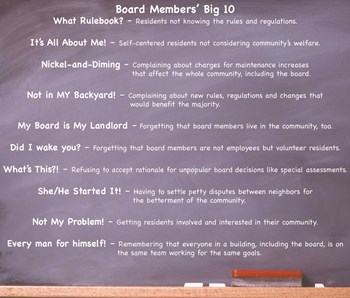
Even in the most well-run, harmonious building or association, problems occasionally arise. Sometimes it’s a truculent resident who seems determined to alienate and annoy everybody within a half-mile radius, sometimes it’s a managing agent who never picks up the phone. Whether board member, manager, or resident, everyone has their Top Ten list of things that bug them.
With that in mind, this month we’ve got the top ten things that drive board members crazy about their residents and the top ten things that make residents pull their hair and curl into the fetal position. More importantly, we’ve got suggestions on how to put all of those trifling items to rest and help board members and residents find a happy common ground.
Board Members’ Big 10
u What Rulebook?
When residents don’t know the rules and regulations of the community in which they live, it causes major headaches for board members and fellow unit owners alike. Jack McGrath, now finishing his 10th year as a board member at The Grande at Colt’s Neck in Colt’s Neck, recalls a neighbor who admitted to Jack that he’d never once read the condo community’s rulebook. Instead, he would come to Jack with questions on what was and wasn’t allowed. Without becoming familiar with regulations, residents have a far greater chance of accidentally breaking a rule, incurring a fine and finding themselves in a mess of trouble down the line.
v It’s All About Me!
Sometimes problems within a community arise simply because residents don’t take the welfare or needs of their neighbors into consideration when doing something. Whether it’s building an ivy-covered trellis that blocks a view or installing a motion detector that floods a neighbor’s bedroom with light at four in the morning—these are the kind of arguments that end up being hashed out at board meetings, taking time and energy away from bigger issues that affect the community as a whole. “It gets back to the board and becomes something they have to solve,” McGrath says.
w Nickel-and-Diming:
“They’ll ask, ‘Why are you charging me?’” says Mona Shyman, vice president of the Federation of New York Housing Cooperatives & Condominiums (FNYHC). “And then the board member has to remind them, “I’m paying the same thing!”
x Not in MY Backyard!
No one likes change, especially when it involves the place they call home. Board members may dislike change more than anyone, however—mostly because they’re the ones who hear the complaints when those amendments go into effect. According to Nina Stanton, a board member for both the New Jersey chapter of Community Associations Institute (CAI-NJ) and Medford Lakes Colony in Medford, changes to pet or sublet rules can be especially contentious.
y My Board is My Landlord
“Sometimes residents forget that board members live [in the community] too,” says Shyman. Tempers might not flare so hot if residents kept in mind that board members are volunteers—they aren’t paid for their time and efforts on behalf of their HOA, and they have to live under the same rules and regulations as their non-board member neighbors.
z Did I Wake You?
While being viewed by non-board residents as landlords is irksome to board members, the opposite can also be a problem, says Stanton. Sometimes residents forget that board members are not their employees. “I’ve had residents who thought nothing of calling me at six in the morning or 11 at night and telling me to come over and fix their air conditioning,” she says. Disrespecting board members’ boundaries and personal time makes for bitter board members—and ultimately compromises their effectiveness as community leaders.
{ What’s This?!
Making financial decisions on someone else’s behalf is never easy—but it’s the responsibility of each and every HOA’s board to do just that. Assessments are never popular, and sometimes pose a financial hardship to residents, but they serve to cover things like unexpected snow removal or skyrocketing fuel or insurance costs. Assessments are painful at the time, but they’re nothing compared to the cost of a lawsuit or a collapsed roof—and they’re usually a board’s last resort.
| She/He Started It!
It’s easy for long-time residents to forget why they moved into a community in the first place. A resident can fall in love with their condo community when they buy into it, then 12 months later get sick of the rules and regulations that make that community what it is. When those frustrations arise, so do opportunities for disagreements among neighbors and with the board.
“I’ve seen instances where neighbors go after each other, suing over ridiculous things,” says McGrath. “Community” might be a nebulous term, but forgetting that an HOA is more than just a collection of buildings or homes and is in fact a community can lead to residents forgetting the Golden Rule and acting very un-neighborly.
} Not My Problem!
Running a community successfully requires the participation of everyone who calls it home. “It can be very difficult to obtain volunteers,” McGrath says. “Unless there’s some important issue or concern, very few residents attend meetings.” He recalls a time when board elections at his HOA had to be postponed three times before they could get a quorum for the vote.
Stanton agrees. “All of our meetings were open once a month and televised on our internal channel,” she recalls. “Still, people were unaware of what was going on. When you put so much into it, it’s very disheartening.”
~ Every man for himself!
Often, an “us-vs.-them” mentality can grow up between a board and its residents. It’s vital to remember that everyone is on the same team, all working toward the same goal: a healthy, happy place to live and enjoy life.
The Other Side of the Coin
Of course, board members are only part of the HOA equation. Residents have a stake in how their building or association community is run—and most have at least one story about a board member or property manager who dropped the ball (or refused to even pick up the ball). So here, in no particular order, are residents’ top gripes about the folks running their HOAs:
u Board members with their own agendas:
No one likes to admit it, but the pros agree that every now and then, someone joins a board not out of an altruistic desire to improve their community, but to push their own private agenda. Whether they’re bent on getting that privacy fence installed across the back of their lot, or doing away with those bushes out front, or even getting a particular super or staff person fired, board members who use their position to force their will on the group can drive residents (and fellow board members) to distraction. It’s counterproductive and rarely works.
v Fee increases:
Just as board members dislike instituting fee increases; their fellow residents don’t like paying them. Loathed as they are however, they’re a necessary evil in a world of increasing costs for everything from heating oil to light bulbs. “You don’t like to raise fees, but sometimes it’s just reality,” McGrath says.
w Lack of communication:
It can be very frustrating for residents to feel as though their ideas or concerns aren’t being heard or acted upon, says Shyman. Hard feelings can arise if letters or e-mails are not answered—and it’s especially galling to residents if their property managers are unresponsive. “Very often, there’s little or no communication between boards and shareholders,” Shyman says. Open, transparent communication in an association helps everyone feel more connected and respected, and reduces the likelihood of misunderstanding or resentment on the part of owners.
x Changing of house rules:
You know how it drives board members crazy when residents don’t abide by new rules? Well, sometimes those new rules can drive residents crazy in and of themselves, especially if the rationale behind them isn’t adequately explained. Say you used to be able to sublet your unit, and now you can’t—or you used to be allowed to own two dogs, and now the limit is one. While acknowledging that change is rarely fun, if the reason for the change is made clear to residents in a way that respects their intelligence and encourages dialogue, the transition may go more smoothly.
y Friends-of-friends:
To those on the outside looking in, many boards can seem like small high school cliques where representation is more about friends and less about representation, says Shyman. For residents thinking of joining the board and volunteering their time, the prospect of having to penetrate some inner circle can be intimidating. Again, it comes down to communication and openness. Board activity should be conducted in the light of day, and participation by residents should be encouraged. To exclude people from the process shortchanges the entire community.
z Not involving residents in problem solving:
This issue goes hand in hand with problems of nepotism and cronyism on boards. Co-op and condo communities often have a vast mix of expertise right under their collective nose with architects, lawyers, plumbers, electricians, accountants, consultants, builders, financial advisors and myriad other professionals living side by side. It can be vexing for residents, says Shyman, when that expertise goes to waste, leaving potential problem solvers on the sidelines.
To make use of a community’s untapped human resources, Shyman is a big proponent of committees. “You need to get people involved,” she says. “If the board is reviewing its insurance policy because of a rate increase, it would be helpful to appeal to residents and ask for anyone involved in the insurance business to sit on a committee and lend their expertise.”
{ Breaches of confidentiality:
As important as communication and openness are, there are some items of board business that really must remain private and confidential. The board meeting room should be like Las Vegas, says Shyman. “What happens in the board meeting stays in the board meeting.” A board meeting is not the place for discussion of residents’ personal issues or problems beyond how they directly affect the community—and it should go without saying that sensitive information about residents should never be discussed beyond meeting room doors.
| Too much stuff to learn:
When residents move into their new homes, they’re often handed a stack of papers that makes the Oxford English Dictionary look like a People magazine. With the excitement and anxiety that go hand in hand with getting a mortgage and buying a condo, the rules and regulations often fall by the wayside. As a board member, Stanton says she got creative, hosting semi-annual teas for new residents to help them learn about their community, meet the association’s employees and learn a bit about what was expected of them as neighbors and community members.
} Forgetting that you’re all on the same team:
When asked initially to talk about common complaints of board members and residents, most of the professionals interviewed for this article said they felt that the list was pretty much going to be the same for both sides of the equation. And at their cores, this is completely true. People just want to be heard, and people in co-op and condo communities all just want to have a safe, harmonious place to live. When residents forget that they’re part of a larger community, or board members forget that they’re there to act as stewards of that community, problems are never far behind.
~ Shared responsibilities and rights:
Board members and residents have much in common. “This often goes back to general misunderstandings about living in a shared community,” says Jo-Ann M. Greenstein, CMCA, PCAM and owner of Advantage Property Management in Morganville. “The rights and responsibilities of both board members and owners as outlined in the community’s Covenants, Conditions & Restrictions (CC&Rs). Those are the documents that come with ownership and explain what’s involved.”
What it all boils down to, says Stanton, is the realization that everyone involved in a co-op or condo community “has to work as a team.” McGrath agrees, adding that “You have to listen. You may not agree with what’s being said, but you have to listen and pay attention to everyone.”
Liz Lent is a freelance writer, teacher and a frequent contributor to The New Jersey Cooperator.






Leave a Comment